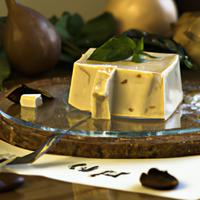
1 serving (14 grams) contains 101 calories, 0.1 grams of protein, 11.3 grams of fat, and 0.1 grams of carbohydrates.

Log this food in SnapCalorie

Nutrition Information
Calories |
1708.5 | ||
|---|---|---|---|
% Daily Value* |
|||
| Total Fat | 192.2 g | 246% | |
| Saturated Fat | 121.0 g | 605% | |
| Polyunsaturated Fat | 0 g | ||
| Cholesterol | 510.2 mg | 170% | |
| Sodium | 26.1 mg | 1% | |
| Total Carbohydrates | 1.4 g | 0% | |
| Dietary Fiber | 0 g | 0% | |
| Sugars | 1.4 g | ||
| protein | 2.1 g | 4% | |
| Vitamin D | 142.4 mcg | 712% | |
| Calcium | 56.9 mg | 4% | |
| Iron | 0.0 mg | 0% | |
| Potassium | 56.9 mg | 1% | |
* Percent Daily Values are based on a 2,000 calorie diet. Your daily values may be higher or lower depending on your calorie needs.
Food Attributes
Source of Calories
About Butterdej
Butterdej, known as puff pastry in English, is a light, flaky dough commonly used in European baking and cooking. Originating in France, it’s made from alternating layers of dough and butter, a process that creates its signature airy texture when baked. Ingredients typically include flour, water, salt, and generous amounts of butter, making it rich in fats. While butterdej is celebrated for its versatility in savory dishes like quiches or sweet treats like Danish pastries, its high butter content leads to significant calories and saturated fats. On the positive side, it provides quick energy due to its carbohydrate content. However, its nutritional profile is better suited for occasional indulgence rather than regular consumption. Pairing it with nutrient-dense fillings like vegetables or lean proteins can help balance its richness while maintaining its delicious character.



